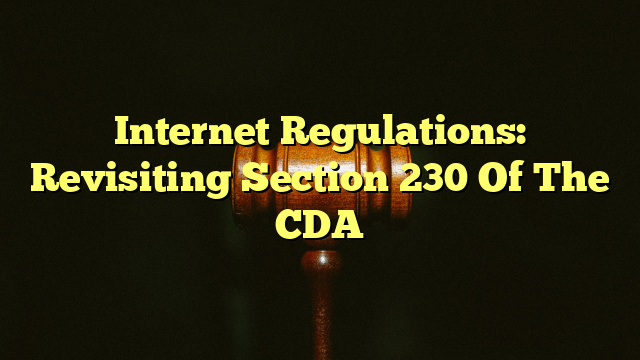Table of Contents
Introduction
Internet regulations have been a topic of debate and discussion for years. One particular law that has garnered attention is Section 230 of the Communications Decency Act (CDA). This law, enacted in 1996, has been instrumental in shaping the landscape of the internet and the responsibilities of online platforms.
What is Section 230 of the Internet law?
Section 230 of the CDA is a provision that grants immunity to online platforms from liability for content posted by their users. It states that “No provider or user of an interactive computer service shall be treated as the publisher or speaker of any information provided by another information content provider.”
This means that platforms like social media websites, online forums, and search engines cannot be held legally responsible for the content posted by their users. This immunity has been crucial in allowing these platforms to thrive and provide spaces for free expression.
Supreme Court Decision on Section 230
The Supreme Court has not made a specific decision on Section 230 of the CDA. However, there have been several cases that have interpreted and applied the provisions of this law. These cases have helped shape the understanding and scope of Section 230.
One notable case is the 1997 decision in Zeran v. America Online, Inc. In this case, the Supreme Court held that online platforms are not liable for the defamatory statements made by their users. This decision reinforced the immunity granted by Section 230 and set a precedent for future cases.
What did Section 230 of the CDA do?
Section 230 of the CDA had two main effects:
- Protection from Liability: It granted immunity to online platforms, protecting them from being held legally responsible for content posted by their users. This allowed platforms to moderate and curate content without fear of facing lawsuits.
- Content Moderation: It encouraged platforms to engage in good faith efforts to moderate and remove objectionable content. By providing immunity, Section 230 incentivized platforms to take action against harmful or illegal content without the fear of being sued for their moderation decisions.
Section 230 Law Review
Section 230 has faced increasing scrutiny in recent years. Critics argue that the law provides too much protection to online platforms, allowing them to escape accountability for harmful content. They argue that platforms should have a greater responsibility to moderate and remove objectionable content.
As a result, there have been calls for a review and potential reform of Section 230. Some propose narrowing the scope of immunity or imposing additional obligations on platforms to address concerns related to hate speech, misinformation, and other harmful content.
However, defenders of Section 230 argue that it is crucial for protecting free speech and fostering innovation on the internet. They contend that any changes to the law should be carefully considered to avoid unintended consequences that could stifle online expression and hinder the growth of online platforms.
Conclusion
Section 230 of the CDA has been a cornerstone of internet regulations, providing immunity to online platforms and shaping the responsibilities of these platforms. While there are ongoing debates about the law and calls for review, its impact on the internet cannot be understated. As technology continues to evolve, it is likely that Section 230 will remain a topic of discussion and potential reform.

